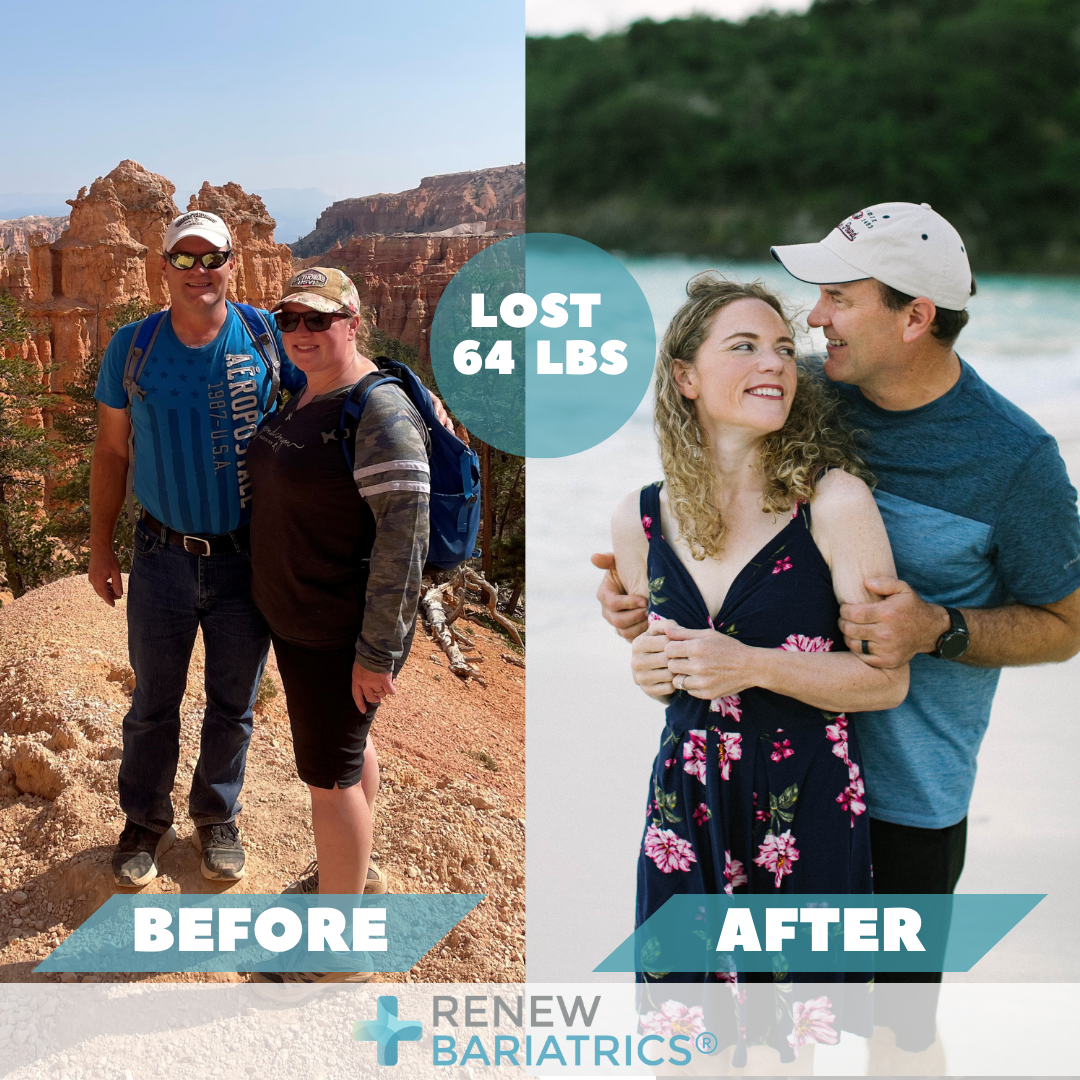#1 Gastric Sleeve Surgery in Tijuana
Felicia
Lost 107 lbs


Robbalee
Lost 270 lbs


Are you looking for an affordable, permanent weight loss solution? Gastric sleeve surgery, or sleeve gastrectomy surgery, is the answer. Enjoy an improved quality of life, decrease the risks of gastric and chronic health issues, and more with gastric sleeve surgery for weight loss.
Gastric sleeve surgery in Tijuana, Mexico, is a safe and reasonably priced option for weight loss. At Renew Bariatrics, we ensure that you will receive exceptional care and that your medical needs are addressed. Our highly skilled board-certified surgeons specialize in gastric sleeve surgery, also known as sleeve gastrectomy surgery, and your procedure will take place in a state-of-the-art, modern hospital.
Why consider medical tourism for gastric sleeve surgery? Gastric sleeve surgery, also known as sleeve gastrectomy surgery, is a safe and effective option.
The Obesity Surgical Center in Tijuana is a modern surgical center that features the latest surgical equipment for gastric sleeve surgery.
Our surgery center features all the amenities you would expect during your treatment. You will have access to high-speed internet and more. Single rooms are available for your privacy and convenience during gastric sleeve surgery.

Choosing the right surgeon for your weight-loss procedure is important. So, what makes Renew Bariatrics surgeons different?
Our surgeons have received training from some of the best medical institutions in the world. They have advanced English language skills. All of our surgeons are board-certified. They have helped thousands of patients like you achieve significant weight loss through gastric sleeve surgery, also known as sleeve gastrectomy surgery.

Dr. Héctor Joaquín Pérez Corzo is a leading bariatric surgeon in Tijuana. Dr. Pérez has more than 15 years of experience performing bariatric surgeries, also known as sleeve gastrectomy surgeries. He is board-certified and has trained at several world-renowned universities, including the University of Miami.

Dr. Green has more than 17 years of experience and has performed thousands of gastric sleeve surgeries, also known as vertical sleeve gastrectomy surgeries. He is board-certified in both bariatric and general surgery. Always looking to provide the best care for his patients, Dr. Green will help you achieve your weight loss goals through gastric sleeve surgery.

Board-certified in gastric sleeve surgery, also known as sleeve gastrectomy surgery, Dr. Rene Armenta is a leading bariatric surgeon. He has performed thousands of gastric sleeve procedures on patients worldwide and is well-respected for his knowledge and expertise in bariatric medicine.

Dr. Antonio Cueva is a respected surgeon board-certified in general surgery. He has more than 18 years of experience in medicine and has performed hundreds of weight loss surgeries, also known as sleeve gastrectomy surgeries. Dr. Cueva is an empathetic surgeon who understands what patients are going through, as he has personally had gastric sleeve surgery himself.
Renew Bariatrics is the leader in gastric sleeve surgery, also known as sleeve gastrectomy surgery, in Tijuana, Mexico. We are a modern, full-service bariatric practice that treats every patient like royalty.
We offer high-quality, safe, and affordable gastric sleeve procedures, also known as sleeve gastrectomies, to help you achieve your weight loss goals and improve your health.
Renew Bariatrics is the leader in gastric sleeve surgery, also known as sleeve gastrectomy surgery, in Tijuana, Mexico. We are a modern, full-service bariatric practice that treats every patient like royalty.
We offer high-quality, safe, and affordable gastric sleeve procedures, also known as sleeve gastrectomies, to help you achieve your weight loss goals and improve your health.

Here at Renew Bariatrics, our team of surgeons offers gastric sleeve surgery, also known as sleeve gastrectomy surgery. This safe and effective weight loss surgery can help improve your quality of life and certain health conditions. Gastric sleeve is one of our most popular surgeries because it is simple, affordable, and effective. This surgery is ideal for obese patients who have experienced little to no success with losing weight through diet and exercise habits.

The gastric balloon is the perfect option for those who want the fantastic results of weight loss procedures but are hesitant to have major surgery. Gastric balloon is a non-surgical, minimally invasive procedure that is highly effective at helping patients lose weight.

Duodenal switch surgery is a more complex yet extremely effective procedure that results in significant overall weight loss. This weight loss procedure can help extremely overweight patients lose enough weight and keep it off. It is an excellent option for patients who want to control metabolic conditions like Type 2 diabetes.

Gastric bypass can help you lose a significant amount of weight in a short time. This surgery helps you lose weight by safely reducing the size of your stomach. Gastric bypass surgery can help you feel fuller quicker and consume fewer calories. It is a safe, effective, and affordable weight-loss option.

Gastric banding is a safe and affordable bariatric procedure to help you lose weight. It reduces the stomach’s capacity, so you feel full quicker and eat less. This procedure can help you achieve significant weight loss.
Many patients put off important surgical procedures due to the high cost of medical care in the US. Medical tourism is an excellent option for patients who want affordable, safe medical care.
With medical tourism, you can have gastric sleeve surgery, also known as sleeve gastrectomy surgery, performed by leading board-certified surgeons at a fraction of the cost of surgery in the US.
Tijuana is one of the most popular medical tourism destinations in the world, especially for gastric sleeve in Mexico, thanks to the quality of medical care. Renew Bariatrics features state-of-the-art facilities that are comparable to clinics in the USA. Moreover, Tijuana is close to home and offers luxury accommodations at an affordable price.
Absolutely! At Renew Bariatrics, safety is our top priority. We follow strict hospital and clinic standards and guidelines for gastric sleeve surgery in Mexico. We have the latest surgical and medical equipment. Our surgeons are well-respected physicians who are focused on patient safety.
Wondering if you are a good candidate for gastric sleeve surgery? If you have a body mass index (BMI) of 30 or over, gastric sleeve surgery may be a good option.
You may also be a good candidate for gastric sleeve if you are obese and have serious health conditions like diabetes, high blood pressure, or sleep apnea.
Start your weight loss journey today. Contact us to see if you qualify for gastric sleeve surgery.
Use the BMI calculator below to determine your body mass index by inputting your height and weight. The BMI calculator uses a formula that produces a score often used to tell whether a person is underweight, a normal weight, overweight, or obese.
BMI
29
You are overweight
Use the weight loss calculator to see how much weight you could lose based on the surgery you select.
So, how much does gastric sleeve surgery cost in Tijuana? The gastric sleeve cost is much less in Tijuana compared to having the surgery performed in the US.
You can receive the same level of care as surgery performed in the US for significantly less money. Patients save as much as 75 percent compared to having the same procedure performed in the US.
Are you ready to take control of your life? Contact us to learn more about gastric sleeve surgery in Tijuana today.











What is Gastric Sleeve?
Gastric sleeve is a surgery procedure that can help individuals lose weight and reduce their risk of obesity-related health conditions. It is a minimally invasive procedure during which part of the stomach is removed, resulting in a reduced amount of food intake.
Gastric sleeve surgery, also called sleeve gastrectomy, is a rapid weight-loss surgery that removes a large portion of the stomach. The surgery is effective in helping people lose weight, and it is a less invasive alternative to gastric bypass
surgery.
It is performed by a skilled bariatric surgeon and requires general anesthesia. During the procedure, approximately 80-85 percent of the stomach is surgically removed, and the remaining portion is formed into a tube or “sleeve” similar in shape to an elongated banana.
About
The gastric sleeve, or sleeve gastrectomy, may be recommended for patients considered high risk for surgery due to their excess weight or underlying medical conditions.
Proper diet and lifestyle changes can help individuals reach their desired weight goal and reduce their risk of obesity-related health conditions. However, post-operative care is essential to ensure the best possible outcomes and maintain long-term success. It is important for patients to be aware that there is a possibility of stretching or enlarging the remaining stomach and to follow dietary guidelines closely to prevent this from happening. Finally, patients need to seek regular medical care after undergoing bariatric surgery to ensure their safety and well-being. With well-being knowledge, support, and guidance, gastric sleeve surgery can be an effective tool for achieving weight loss success.

Bariatric services are medical procedures and treatments designed to help individuals who are overweight or obese lose weight and improve their overall health. These services include a liquid diet and regular exercise planning, nutritional counseling, and surgical interventions such as gastric bypass or sleeve gastrectomy.


This laparoscopic surgery is a popular surgical weight loss procedure that can help those affected by severe obesity reduce their caloric intake, stemming from the removal of a large portion of their stomach. This highly effective surgical technique can result in significant weight loss and improved physical well-being, especially when accompanied by lifestyle changes like exercise, healthier eating habits, and good mental health practices.
Renew Bariatrics is designed to help individuals achieve lasting weight loss and improve their overall health. From counseling to surgical procedures, bariatric services offer assessments and tools customized to everyone’s needs, ensuring the highest levels of care from start to finish. Patients can find a range of personalized treatments that enable them to take control of their health in a safe, supportive atmosphere constructed around their journey.

Before undergoing any weight loss surgery, it is important to understand all aspects of the procedure, including the pre-and post-operative diet. Patients should work with a nutritionist to create an individualized plan that meets their dietary needs and lifestyle requirements.

During the procedure, the surgeon will make several small incisions in the abdomen and will use a laparoscope (a thin tube with a camera attached) to view the stomach. Then, they will use special tools to remove a portion of the stomach, leaving a “sleeve.” The remaining stomach is then attached to the small intestine. Following the completion of the surgery, the healthcare team will provide the patient with a special diet plan to follow, aiding in the success of the weight loss procedure. They will also need regular check-ups with their doctor to monitor their progress.
A pre-operative diet is an important part of the surgery. This diet is designed to shrink the size of the liver and reduce the risk of surgical complications during the procedure. It is also designed to reduce the amount of fat in the liver, which can interfere with the procedure. The pre-operative diet typically consists of a low-calorie, low-carbohydrate diet. This means limiting the number of refined carbohydrates, such as white bread, pasta, and white rice, and focusing on lean proteins, fresh fruits and vegetables, and low-fat dairy products. It is important to drink plenty of fluids, such as water and low-calorie juices. In addition to following a pre-operative diet, it is important to avoid tobacco, alcohol, and certain medications before the surgery. It is also important to prepare for the surgery by getting proper rest, managing stress, and following any pre-operative instructions from your surgeon

Following this type of weight-loss surgery, it is imperative to transition from liquid to solid regular food gradually. To ensure an easier and faster recovery after surgery, here are some tips for you:

It is important to drink plenty of fluids throughout the day, such as water, sugar-free drinks, and decaffeinated tea and coffee. This will help to keep your body hydrated and flush out toxins.

Eating smaller meals, 5-6 times a day, is recommended for surgery patients. This helps to ensure that you are getting enough nutrition without over-filling your stomach.

Your doctor will likely recommend that you eat soft regulars such as mashed potatoes, scrambled eggs, and cooked cereal for up to two weeks after your surgery.

Avoid processed and high-fat foods such as chips, fast food, and candy. These foods tend to be high in calories and can contribute to regaining weight.

Carbonated drinks and alcohol can irritate your stomach and slow down your recovery.
Daily vitamins and supplements are an important part of postoperative care. It is important to take multivitamins daily to help with nutrient absorption. Additionally, some patients may be required to take iron, calcium, and vitamin B12 supplements. It is important to follow your doctor’s instructions regarding vitamins and supplements, as well as take them at the prescribed time and dosage. It is also important to keep up with regular check-ups and monitor your vitamin levels to ensure that you are getting enough of the necessary nutrients.

On the day of surgery, it is important to follow all the pre-operative instructions given by your surgeon. This includes having an empty stomach and avoiding any food or drink for at least 8 hours before surgery.

If you experience symptoms such as severe abdominal pain, bloody stools, or fever after the surgery, it is important to contact your doctor immediately or go to the emergency room.

Hours after surgery, it is important to follow lifestyle habit changes such as healthy eating habits and regular exercise for faster recovery. Additionally, patients should continue to attend regular check-ups with their doctor to monitor their progress.
Gastric sleeve surgery is considered to be a permanent procedure, meaning the stomach shouldn’t be stretched. Eating too much or consuming high-calorie foods can cause the stomach to stretch out again, however, it will not return to its original size. Patients need to maintain good eating habits and follow their postoperative diet to avoid any unwanted weight gain or stretching of the stomach.
The weight lost after sleeve gastrectomy surgery can vary from person to person, but usually, the average weight loss is around 50-70% of the excess body weight. This means that if you are 100 pounds overweight, you can expect to lose 50-70 pounds after having the surgery. Research has shown that most people maintain weight loss for up to five years after the surgery. It is important to remember that while sleeve gastrectomy surgery can help you lose weight, it is not a miracle cure. It is important to maintain a healthy lifestyle and diet to keep the weight off. This includes following a healthy diet, exercising regularly, and making lifestyle changes to maintain your weight loss results.


Life after sleeve gastrectomy can be challenging, especially if you hit a weight plateau. A weight plateau occurs when your weight stops decreasing despite your best efforts. It is normal to experience a weight plateau after sleeve gastrectomy as your body adjusts to the changes. However, there are ways to overcome a weight plateau and continue to lose weight.
It is important to remember that the changes after a sleeve gastrectomy are not just physical. Many people find that their emotional and mental state also shifts after surgery, and it is important to be aware of these changes. If you find that making lifestyle changes and maintaining your weight loss becomes difficult, it can help to talk to a professional such as a therapist or nutritionist.


It is also important to be aware of any changes in your personality after a sleeve gastrectomy. Many people find that they have more energy and are more motivated after the surgery, which can cause them to become more confident and outgoing. It is important to take time to adjust to these changes, as well as accept them. Everyone’s experience is different, and it can take time to find what works for you.
Weight loss can also have an impact on relationships. It is important to be aware of how any changes in your body or lifestyle might affect your existing relationships with others, and it can help to talk openly to those around you about your journey. Also, remember that while the physical changes after a sleeve gastrectomy are significant, they are not the only thing that matters. Keep an open mind and be aware of any changes in your relationships after surgery, as well as how you can adjust to them.


Maintaining the results of the procedure requires effective and meaningful lifestyle changes. Like any effective weight loss program, reducing calories and maintaining a healthy diet of nutrient-dense foods is essential for success. Developing a regular exercise routine can also be beneficial as it not only increases metabolism but can reduce stress levels and cravings. Along with keeping physically active, establishing effective habits like meal prepping, tracking intake, planning out weekly meals, and scheduling regular check-ins with the doctor are all effective practices that should be followed to maintain effective weight loss.
Gastric sleeve surgery is associated with several risks and benefits. Some of the risks include infection, bleeding, hernia formation, or blood clots in the legs. Benefits include significant weight loss and a decrease in obesity-related health conditions such as type 2 diabetes. The procedure can also help patients live healthier lifestyles by providing them with the motivation to exercise and maintain a balanced diet.


The recovery period following the surgery will vary depending on the individual. Generally, patients can expect to stay in the hospital for one night and return home with instructions for taking it easy for at least two weeks after the procedure. Patients may experience some pain or discomfort during this time; however, any pain should subside as they recover.
Use the options below to see what your estimated weight loss will be for the various types of surgeries available.
Starting Weight
155 lbs
After 12-18 Months
155 lbs
Estimated Weight Loss
With you're estimated to lose 67 lbs over 12-18 months
You are currently below your ideal body weight and thus not a candidate for surgery.
Ideal Body Weight (IBW) represents the weight a person should be for their height. Excess Body Weight (EBW) is the amount of weight a person is over their IBW.
Frequently asked questions by those interested bariatric surgeries in Mexico.
The best way to determine which bariatric surgery procedure is right for you is to discuss your options with your doctor. Your doctor will evaluate your health and weight loss goals to determine which type of bariatric surgery is the best fit.
The best candidates for gastric sleeve surgery are those who are significantly overweight, have not had success with other weight loss methods, and have no major underlying medical conditions. Your doctor will be able to help you determine if this type of surgery is right for you.
Health insurance coverage for gastric sleeve surgery will depend on the specific plan and policy you have. Most health insurance plans require that you meet certain qualifications before they approve coverage for gastric sleeve surgery. These qualifications vary by plan and may include documentation of pre-existing medical conditions, documentation of attempts to lose weight through diet and exercise, and documentation of prior medical treatments. It is important to contact your health insurance provider to find out if they cover including gastric sleeve surgery.
Gastric sleeve surgery (also known as sleeve gastrectomy) is a type of weight-loss surgery that reduces the size of the stomach to help with weight loss. The procedure removes a large portion of the stomach, leaving a small tube-shaped section that is connected to the small intestine. This limits the amount of food a person can eat and reduces the number of calories and nutrients absorbed by the body. This is often recommended as an initial step in a weight-loss plan, before more aggressive surgical measures, such as gastric bypass surgery.
A gastric sleeve is a type of bariatric surgery that helps people with morbid obesity lose weight. During the procedure, a surgeon removes a large portion of the stomach and creates a sleeve- or tube-shaped stomach that is much smaller than the original one. Patients typically experience a feeling of fullness more quickly, helping them to eat smaller meals. Because the new stomach cannot stretch to hold large amounts of food, patients also feel satiated more quickly and are more likely to avoid overeating.
The American Society for Metabolic and Bariatric Surgery reported that in 2020, gastric sleeve surgery was the most-performed bariatric procedure across the United States–responsible for above 68% of all such surgeries conducted. An astonishing 200,000+ individuals underwent this relatively common operation last year alone.
Candidates must be 18 years or older and must commit to making lifestyle changes, such as following a healthier diet and get regular exercise, to maintain weight loss after the procedure. Candidates must also have a body mass index (BMI) of 40 or higher or a BMI of 35–39, diabetes, hypertension, sleep apnea, or reflux. Furthermore, the patient must have failed to lose excess weight through other weight loss methods such as diet and exercise. The procedure also helps to reduce levels of the hunger hormone, ghrelin, which can help to reduce appetite. Gastric sleeve surgery can also help to reduce levels of diabetes, high blood pressure and other health conditions.
The procedure typically takes 1-3 hours to complete. The patient is usually discharged from the hospital on the same day but may need to stay overnight if there are any complications.
Yes, following a strict diet is a significant part of the post-surgery process. Your doctor will provide you with a diet plan to follow as you recover from surgery. This plan will include specific caloric intake, food groups, and eating schedules. Following a diet after gastric sleeve surgery will ensure you get the maximum benefit from the procedure, aid in the healing process, and help you maintain a healthy weight.
The most common risks associated with surgery include infection, bleeding, hernia formation, or blood clots in the legs. These risks can be minimized by following pre- and post-operative instructions carefully and taking all medications as directed by your doctor. Other possible complications include nausea, vomiting, and dumping syndrome (a condition where food moves too quickly through the stomach). Overall, gastric sleeve surgery is considered relatively safe and has a high success rate.
The amount of weight lost with the gastric sleeve procedure varies from person to person; however, patients can expect to lose anywhere from 30-60% of their excess weight. It is important to remember that this procedure does not guarantee success and requires lifestyle changes such as following a balanced diet and exercising regularly for the best results.
The complications and risks associated with the surgery include bleeding and infection, blood clots, leakage from the surgical site, nausea and vomiting, difficulty swallowing, gallstones, nutritional deficiencies, Hernia, long-term acid reflux, low blood sugar, intestinal obstruction, and a bowel perforation.
After surgery, it is important to focus on high-protein, low-calorie foods. You will also be required to incorporate vitamin and mineral supplements into your diet to avoid nutritional deficiencies. Your doctor or nutritionist can provide you with more specific dietary guidelines.
If you are considering gastric sleeve surgery, it is important to discuss your options with your doctor and make sure that this type of surgery is right for you. Your doctor can help guide you through the process of selecting a bariatric surgeon, setting up pre-op tests, and preparing for surgery. Additionally, they can provide you with helpful resources and reliable information sources. Finally, it is important to remember that gastric sleeve surgery is a major step and requires a serious commitment to lifestyle changes to be successful.
Gastric sleeve surgery helps to treat obesity and related conditions, such as type 2 diabetes, hypertension, sleep apnea, and reflux. The surgery can also help reduce the risk of certain cancers and improve the overall quality of life.
Yes, it is generally considered safe. However, as with any major surgery, there are potential risks and complications. These include infection, bleeding, and blood clots, as well as risks associated with anesthesia and the use of medical instruments. It is important to discuss the potential risks and benefits of the procedure with your doctor before undergoing the surgery.
Before undergoing the surgery, a person typically has an initial consultation with a bariatric surgeon. During this consultation, the surgeon will assess the patient’s overall health, go over their medical history, and discuss the risks, benefits, and alternatives to the surgery. The surgeon may also discuss a nutrition and physical activity plan with the patient. Before the surgery, the patient may need to complete diagnostic tests, such as a blood test, an EKG, or an upper endoscopy. The patient should also stop taking certain medications and start taking vitamins and other supplements as recommended by the surgeon. Most patients will also start following a pre-surgical liquid diet before the procedure. It is important to carefully follow all pre-surgical instructions to ensure a safe and successful outcome.
After gastric sleeve surgery, the patient will need to stay in close contact with their surgeon and follow all post-operative instructions. This includes following a post-op diet, taking prescribed medications and vitamins, and avoiding strenuous activity for at least two weeks after the procedure. The patient may experience some discomfort in the first few days after the procedure and will also need to adhere to guidelines for eating and drinking. Most patients can return to their normal activities within two weeks. It is important to remember that long-term success depends on making lifestyle changes, such as following a healthier diet and exercising regularly.
The surgery is a relatively safe and minimally invasive procedure with many advantages. It reduces the size of the stomach and can help people lose a significant amount of weight in a short period. The procedure also has fewer risks than other bariatric procedures such as gastric bypass, and it does not require re-routing or re-structuring of the small intestines. Additionally, patients usually have a quicker recovery time and fewer post-operative complications following gastric sleeve surgery than with other bariatric surgeries.
Most patients will be able to return to their normal activities within two weeks. However, it is important to follow your doctor’s instructions and avoid any strenuous activity during the recovery period. Additionally, special diets and vitamin supplements may need to be taken for several months after surgery to promote proper healing and nutrition.
The best way to determine which bariatric surgery procedure is right for you is to discuss your options with your doctor. Your doctor will evaluate your health and weight loss goals to determine which type of bariatric surgery is the best fit.
The best candidates for gastric sleeve surgery are those who are significantly overweight, have not had success with other weight loss methods, and have no major underlying medical conditions. Your doctor will be able to help you determine if this type of surgery is right for you.
Health insurance coverage for gastric sleeve surgery will depend on the specific plan and policy you have. Most health insurance plans require that you meet certain qualifications before they approve coverage for gastric sleeve surgery. These qualifications vary by plan and may include documentation of pre-existing medical conditions, documentation of attempts to lose weight through diet and exercise, and documentation of prior medical treatments. It is important to contact your health insurance provider to find out if they cover including gastric sleeve surgery.
Gastric sleeve surgery (also known as sleeve gastrectomy) is a type of weight-loss surgery that reduces the size of the stomach to help with weight loss. The procedure removes a large portion of the stomach, leaving a small tube-shaped section that is connected to the small intestine. This limits the amount of food a person can eat and reduces the number of calories and nutrients absorbed by the body. This is often recommended as an initial step in a weight-loss plan, before more aggressive surgical measures, such as gastric bypass surgery.
A gastric sleeve is a type of bariatric surgery that helps people with morbid obesity lose weight. During the procedure, a surgeon removes a large portion of the stomach and creates a sleeve- or tube-shaped stomach that is much smaller than the original one. Patients typically experience a feeling of fullness more quickly, helping them to eat smaller meals. Because the new stomach cannot stretch to hold large amounts of food, patients also feel satiated more quickly and are more likely to avoid overeating.
The American Society for Metabolic and Bariatric Surgery reported that in 2020, gastric sleeve surgery was the most-performed bariatric procedure across the United States–responsible for above 68% of all such surgeries conducted. An astonishing 200,000+ individuals underwent this relatively common operation last year alone.
Candidates must be 18 years or older and must commit to making lifestyle changes, such as following a healthier diet and get regular exercise, to maintain weight loss after the procedure. Candidates must also have a body mass index (BMI) of 40 or higher or a BMI of 35–39, diabetes, hypertension, sleep apnea, or reflux. Furthermore, the patient must have failed to lose excess weight through other weight loss methods such as diet and exercise. The procedure also helps to reduce levels of the hunger hormone, ghrelin, which can help to reduce appetite. Gastric sleeve surgery can also help to reduce levels of diabetes, high blood pressure and other health conditions.
The procedure typically takes 1-3 hours to complete. The patient is usually discharged from the hospital on the same day but may need to stay overnight if there are any complications.
Yes, following a strict diet is a significant part of the post-surgery process. Your doctor will provide you with a diet plan to follow as you recover from surgery. This plan will include specific caloric intake, food groups, and eating schedules. Following a diet after gastric sleeve surgery will ensure you get the maximum benefit from the procedure, aid in the healing process, and help you maintain a healthy weight.
The most common risks associated with surgery include infection, bleeding, hernia formation, or blood clots in the legs. These risks can be minimized by following pre- and post-operative instructions carefully and taking all medications as directed by your doctor. Other possible complications include nausea, vomiting, and dumping syndrome (a condition where food moves too quickly through the stomach). Overall, gastric sleeve surgery is considered relatively safe and has a high success rate.
The amount of weight lost with the gastric sleeve procedure varies from person to person; however, patients can expect to lose anywhere from 30-60% of their excess weight. It is important to remember that this procedure does not guarantee success and requires lifestyle changes such as following a balanced diet and exercising regularly for the best results.
The complications and risks associated with the surgery include bleeding and infection, blood clots, leakage from the surgical site, nausea and vomiting, difficulty swallowing, gallstones, nutritional deficiencies, Hernia, long-term acid reflux, low blood sugar, intestinal obstruction, and a bowel perforation.
After surgery, it is important to focus on high-protein, low-calorie foods. You will also be required to incorporate vitamin and mineral supplements into your diet to avoid nutritional deficiencies. Your doctor or nutritionist can provide you with more specific dietary guidelines.
If you are considering gastric sleeve surgery, it is important to discuss your options with your doctor and make sure that this type of surgery is right for you. Your doctor can help guide you through the process of selecting a bariatric surgeon, setting up pre-op tests, and preparing for surgery. Additionally, they can provide you with helpful resources and reliable information sources. Finally, it is important to remember that gastric sleeve surgery is a major step and requires a serious commitment to lifestyle changes to be successful.
Gastric sleeve surgery helps to treat obesity and related conditions, such as type 2 diabetes, hypertension, sleep apnea, and reflux. The surgery can also help reduce the risk of certain cancers and improve the overall quality of life.
Yes, it is generally considered safe. However, as with any major surgery, there are potential risks and complications. These include infection, bleeding, and blood clots, as well as risks associated with anesthesia and the use of medical instruments. It is important to discuss the potential risks and benefits of the procedure with your doctor before undergoing the surgery.
Before undergoing the surgery, a person typically has an initial consultation with a bariatric surgeon. During this consultation, the surgeon will assess the patient’s overall health, go over their medical history, and discuss the risks, benefits, and alternatives to the surgery. The surgeon may also discuss a nutrition and physical activity plan with the patient. Before the surgery, the patient may need to complete diagnostic tests, such as a blood test, an EKG, or an upper endoscopy. The patient should also stop taking certain medications and start taking vitamins and other supplements as recommended by the surgeon. Most patients will also start following a pre-surgical liquid diet before the procedure. It is important to carefully follow all pre-surgical instructions to ensure a safe and successful outcome.
After gastric sleeve surgery, the patient will need to stay in close contact with their surgeon and follow all post-operative instructions. This includes following a post-op diet, taking prescribed medications and vitamins, and avoiding strenuous activity for at least two weeks after the procedure. The patient may experience some discomfort in the first few days after the procedure and will also need to adhere to guidelines for eating and drinking. Most patients can return to their normal activities within two weeks. It is important to remember that long-term success depends on making lifestyle changes, such as following a healthier diet and exercising regularly.
The surgery is a relatively safe and minimally invasive procedure with many advantages. It reduces the size of the stomach and can help people lose a significant amount of weight in a short period. The procedure also has fewer risks than other bariatric procedures such as gastric bypass, and it does not require re-routing or re-structuring of the small intestines. Additionally, patients usually have a quicker recovery time and fewer post-operative complications following gastric sleeve surgery than with other bariatric surgeries.
Most patients will be able to return to their normal activities within two weeks. However, it is important to follow your doctor’s instructions and avoid any strenuous activity during the recovery period. Additionally, special diets and vitamin supplements may need to be taken for several months after surgery to promote proper healing and nutrition.
There are a few alternatives to gastric sleeve surgery. One option is to try weight loss pills, such as Qsymia or Belviq. These pills help you lose weight by suppressing your appetite and increasing your metabolism.
You could also try diet and exercise to lose weight. Diet and exercise are the healthiest and most sustainable options for weight loss, but they may take longer to see results. Other options include weight loss injections, personal coaching, and counseling.
There are a number of less expensive bariatric surgery procedures available, including laparoscopic gastric balloon procedure. Additionally, there are a number of alternatives to bariatric surgery in general, including diet and lifestyle changes, weight loss medications, and weight loss injections. It is important to speak with your primary care physician about the best option for you. Each person’s situation is different, and the best option for one person may not be the best option for another.
The first step is always the hardest, but once you get started, it becomes easier and easier to keep going. So take the first step today and start breaking those bad habits that are keeping you from being your best self.
If you are interested in learning more about gastric sleeve in Mexico, speak with our team. By doing this, you can learn more about the different procedures available and determine which one is best for you.

Copyright © 2023 Renew Bariatrics, Inc.
“Individual results are not guaranteed and may vary, please refer to our disclaimer page. This content is not intended to be a substitute for professional medical advice, diagnosis, or treatment. Always seek the advice of your physician or another qualified health provider.”
“Renew Bariatrics, Inc. is a medical tourism scheduling facilitator, not a healthcare provider.”